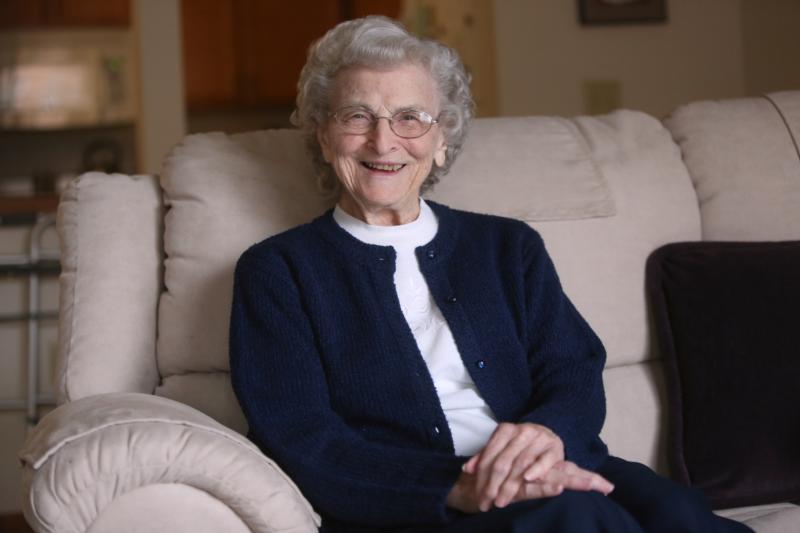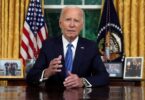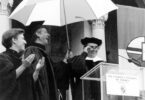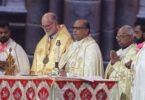
Sister Mary Madonna Ashton, 92, a Sister of St. Joseph of Carondelet, poses for a photo March 9 in Minnesota. She is one of 16 to receive the 2016 National Women’s History Month award “Working to Form a More Perfect Union: Honoring Women in Public Service and Government.” (CNS photo/Dave Hrbacek, The Catholic Spirit)
by Jessica Weinberger
ST. PAUL, Minn. (CNS) — For Sister Mary Madonna Ashton, 92, a Sister of St. Joseph of Carondelet, there’s no such thing as a career plan.
“You have to take opportunities as they come along,” she said in her apartment at Carondelet Village in St. Paul. “Don’t decide what you want to do in your future and seal it in, because you never know what opportunities are going to come your way.”
Sister Mary Madonna’s openness to new opportunities — and God’s will — led her to become a Catholic in college and join the Sisters of St. Joseph of Carondelet days before her 23rd birthday. She then began her extensive career in health care, later serving as president and CEO of St. Mary’s Hospital (since sold to Fairview Health Services) and then as Minnesota’s first female, non-physician commissioner of health.
For her lifelong commitment to public service, she has been honored alongside 15 others with the 2016 National Women’s History Month award, “Working to Form a More Perfect Union: Honoring Women in Public Service and Government.” She is the oldest living recipient to be honored and only the second woman religious since the project began in 1980.
She received the award March 19 at a Women’s History Project award ceremony in Washington.
Sister Mary Madonna’s career began at St. Joseph’s Hospital in St. Paul, where she worked in the new field of medical social work. After earning a master’s degree in hospital administration, she transitioned to administrative roles at St. Mary’s Hospital in Minneapolis and was appointed president and CEO in 1962.
The stress of managing the operations of the entire hospital made her wonder if she could last eight years in the role like her predecessor.
“I spent a lot of time in chapel, I’ll tell you that,” she said with a chuckle.
Twenty years later, Sister Mary Madonna resigned, closing one chapter in hopes of using her skills and passion for health care in a new capacity.
Just one year later, she began that new chapter in the public sector as Minnesota’s first woman and non-physician commissioner of health. Appointed directly by Gov. Rudy Perpich, Sister Mary Madonna didn’t anticipate the negative reaction to her appointment.
While accepting of Sister Mary Madonna as a female and religious sister, the medical community was not convinced that a non-physician could serve in the highly visible role. They wrote a letter to the governor chiding him for not taking into account their counsel, but Perpich stood firm in his decision, and Sister Mary Madonna turned her attention to the many challenges before her.
For instance, at the start of her eight-year term, Minnesota had only four known cases of AIDS, and officials nationwide were working to understand the impact of the relatively unknown disease.
Simultaneously, Sister Mary Madonna was tackling tobacco usage in the state and helped pass landmark legislation outlawing smoking in public places and on public property. She spent one week testifying directly against the tobacco industry, and her efforts started a national movement.
“I grew to really appreciate legislators and how hard they work and the difficulties they have with so many propositions being presented to them, most of which are good,” Sister Mary Madonna told The Catholic Spirit, newspaper of the Archdiocese of St. Paul and Minneapolis.
When her term ended in 1991, Sister Mary Madonna invited Sisters of St. Joseph of Carondelet from across the Twin Cities to meet to discuss health care needs in the community. She expected 30 sisters to attend, but was greeted by more than 100. Together, they focused on one of the largest under-served populations — individuals and families without insurance who don’t qualify for public health programs.
“There is this group in between,” she explained. “The minute you have any kind of a health problem, you can sink right into poverty and lose everything.”
Using her network, Sister Mary Madonna formed a group of more than 300 volunteer physicians, nurses and support personnel to establish St. Mary’s Health Clinics. The first clinic opened in January 1992, and, using spaces donated by churches, schools and community centers, clinics began providing free medical care, outreach and education to low-income, uninsured families and individuals not eligible for government programs.
When Sister Mary Madonna retired in 2000, the nonprofit operated 11 clinics throughout the Twin Cities, and it continues to serve this “in-between group,” believing that health care is a basic human right. The organization’s clinics have provided more than 105,000 patient visits through nearly 16,000 donated volunteer hours since its founding.
Sister Mary Madonna then served as the archdiocese’s delegate for religious, working for three years in the part-time role before retiring once again before her 90th birthday.
Asked about her biggest accomplishment, her work establishing St. Mary’s Health Clinics rises to the top, she said, noting the far-reaching impact on individuals who were falling through the cracks.






